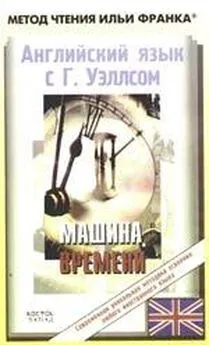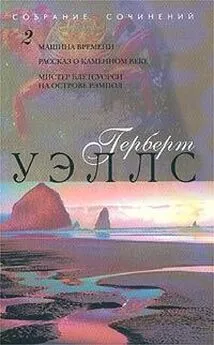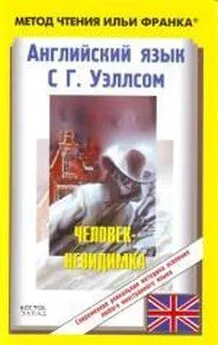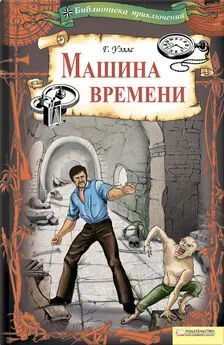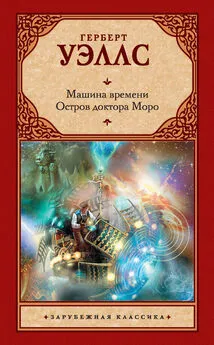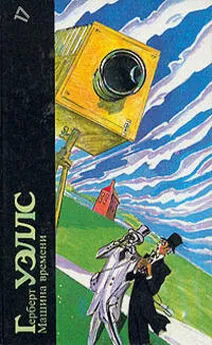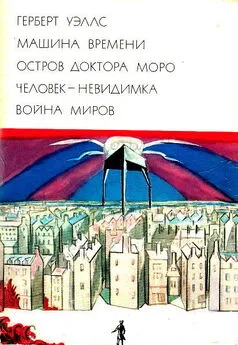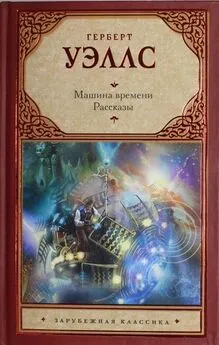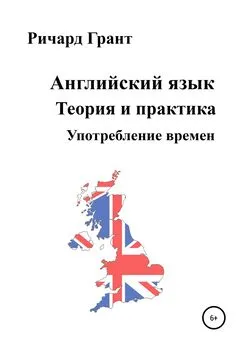H. Wells - Английский язык с Гербертом Уэллсом. Машина Времени
- Название:Английский язык с Гербертом Уэллсом. Машина Времени
- Автор:
- Жанр:
- Издательство:неизвестно
- Год:неизвестен
- ISBN:нет данных
- Рейтинг:
- Избранное:Добавить в избранное
-
Отзывы:
-
Ваша оценка:
H. Wells - Английский язык с Гербертом Уэллсом. Машина Времени краткое содержание
Английский язык с Гербертом Уэллсом. Машина Времени - читать онлайн бесплатно полную версию (весь текст целиком)
Интервал:
Закладка:
Yet it was evident that if I was to flourish matches with my hands (было очевидно, что если мне придется зажигать спички; to flourish — цвести, расцветать; зд. зажигать ) I should have to abandon my firewood (я должен буду бросить сучья, /набранные/ для костра; to abandon — покидать, оставлять ); so, rather reluctantly, I put it down (поэтому я достаточно неохотно положил /сучья на землю/; reluctant — делающийчто-либосбольшойнеохотой, попринуждению ). And then it came into my head that I would amaze our friends behind by lighting it (и тут мне пришло в голову, что я могу поразить наших друзей сзади, если подожгу их; to amaze — изумлять, поражать ). I was to discover the atrocious folly of this proceeding (/впоследствии/ мне пришлось обнаружить чудовищную глупость этого поступка; to proceed — продолжать; действовать, поступать; proceeding — акт, действие, дело, поступок ), but it came to my mind as an ingenious move for covering our retreat (но /тогда/ мне пришло в голову = мнепоказалось , /что это/ остроумный шаг = маневр для прикрытия нашего отступления; ingenious — изобретательный, находчивый; остроумный; move — движение, переменаместа; поступок, шаг ).
reluctantly [rI`lAktqntlI], atrocious [q`trquSqs], ingenious [In`GJnIqs]
Yet it was evident that if I was to flourish matches with my hands I should have to abandon my firewood; so, rather reluctantly, I put it down. And then it came into my head that I would amaze our friends behind by lighting it. I was to discover the atrocious folly of this proceeding, but it came to my mind as an ingenious move for covering our retreat.
'I don't know if you have ever thought what a rare thing flame must be in the absence of man and in a temperate climate (не знаю, задумывались ли вы когда-нибудь над тем, какой редкой вещью = редкостью пламя должно быть при отсутствии людей в умеренном климате; temperate— воздержанный, сдержанный, умеренный ). The sun's heat is rarely strong enough to burn (солнечный жар редко достаточно силен, чтобы = способен поджечь /что-нибудь/), even when it is focused by dewdrops (даже когда он сфокусирован каплями росы; tofocus— собирать, помещать в фокусе; фокусировать ), as is sometimes the case in more tropical districts (как иногда случается в большинстве тропических районов; case— случай, обстоятельство, положение, дело, факт ). Lightning may blast and blacken (молния может поразить и испепелить; toblast— играть на духовом инструменте; заражать, поражать; toblacken— чернеть; зд. испепелить ), but it rarely gives rise to widespread fire (но редко дает подъем = начало широко распространяющемуся = большому пожару). Decaying vegetation may occasionally smoulder with the heat of its fermentation (гниющая растительность иногда тлеет от теплоты своих /внутренних/ химических реакций; tosmoulder— медленно гореть /без огня/, тлеть ), but this rarely results in flame (но это редко приводит к пламени = возгоранию; toresultin— приводить /к чему-либо/, иметь исход ). In this decadence, too, the art of fire-making had been forgotten on the earth (а в этот период упадка также /и само/ искусство добывания огня было позабыто на земле). The red tongues that went licking up my heap of wood were an altogether new and strange thing to Weena (красные языки, которые начали лизать мою груду хвороста, были /чем-то/ совершенно новым и странным для Уины; to lick — лизать, облизывать ).
temperate [`temp(q)rIt], dewdrop [`djHdrOp], decadence [`dekqd(q)ns]
'I don't know if you have ever thought what a rare thing flame must be in the absence of man and in a temperate climate. The sun's heat is rarely strong enough to burn, even when it is focused by dewdrops, as is sometimes the case in more tropical districts. Lightning may blast and blacken, but it rarely gives rise to widespread fire. Decaying vegetation may occasionally smoulder with the heat of its fermentation, but this rarely results in flame. In this decadence, too, the art of fire-making had been forgotten on the earth. The red tongues that went licking up my heap of wood were an altogether new and strange thing to Weena.
'She wanted to run to it and play with it (она хотела подбежать к нему = пламени и поиграть с ним). I believe she would have cast herself into it (я полагаю, что она бы даже бросилась в него = огонь; to cast — бросать, кидать, швырять ), had I not restrained her (не удержи я ее; to restrain — сдерживать, удерживать ). But I caught her up, and in spite of her struggles (но я подхватил ее и, несмотря на ее сопротивление; struggle — борьба, сопротивление ), plunged boldly before me into the wood (смело бросился: «нырнул» прямо: «перед собой» в лес; to plunge — нырять; бросаться ). For a little way the glare of my fire lit the path (некоторое время свет моего костра освещал нам дорогу). Looking back presently, I could see, through the crowded stems (потом, оглянувшись назад, я смог увидеть = увидел сквозь частые стволы деревьев; crowded — переполненный, сжатый; crowd— толпа ), that from my heap of sticks the blaze had spread to some bushes adjacent (что от моей груды сучьев пламя распространилось = перекинулось на некоторые соседние кусты; adjacent — расположенныйрядом, смежный, соседний ), and a curved line of fire was creeping up the grass of the hill (и изогнутая полоса огня поползла вверх по траве на холм; to curve — гнуть; изгибать/ся/, перегибать ).
plunge [plAnG], adjacent [q`GeIs(q)nt], curve [kWv]
'She wanted to run to it and play with it. I believe she would have cast herself into it had I not restrained her. But I caught her up, and in spite of her struggles, plunged boldly before me into the wood. For a little way the glare of my fire lit the path. Looking back presently, I could see, through the crowded stems that from my heap of sticks the blaze had spread to some bushes adjacent, and a curved line of fire was creeping up the grass of the hill.
'I laughed at that, and turned again to the dark trees before me (я посмеялся над этим и снова повернулся к темным деревьям передо мной). It was very black (там было очень темно), and Weena clung to me convulsively (и Уина судорожно прижалась ко мне; to cling —цепляться, прилипать; крепкодержаться ), but there was still, as my eyes grew accustomed to the darkness, sufficient light for me (но там было, поскольку мои глаза /быстро/ привыкли к темноте, достаточно света для меня; to grow /get/ accustomed to — привыкнуть/кчему-либо/; sufficient — достаточный, обоснованный ) to avoid the stems (чтобы избегать стволов = не натыкаться на стволы). Overhead it was simply black (над головой было просто черно), except where a gap of remote blue sky shone down upon us here and there (за исключением клочка далекого голубого неба, сиявшего нам то тут, то там). I struck none of my matches (я не зажег ни одной спички), because I had no hand free (потому что руки мои не были свободны = были заняты). Upon my left arm I carried my little one (на левой руке я нес свою малышку /Уину/), in my right hand I had my iron bar (а в правой я держал свой железный лом).
convulsively [kqn`vAlsIvlI], overhead [`quvehed], none [nAn]
'I laughed at that, and turned again to the dark trees before me. It was very black, and Weena clung to me convulsively, but there was still, as my eyes grew accustomed to the darkness, sufficient light for me to avoid the stems. Overhead it was simply black, except where a gap of remote blue sky shone down upon us here and there. I struck none of my matches because I had no hand free. Upon my left arm I carried my little one, in my right hand I had my iron bar.
'For some way I heard nothing but the crackling twigs under my feet (некоторое время я не слышал ничего, кроме треска веток под ногами; to crackle — трещать, хрустеть ), the faint rustle of the breeze above (легкого шелеста ветра наверху; breeze — легкийветерок; rustle — шелест, шуршание ), and my own breathing and the throb of the blood-vessels in my ears (своего собственного дыхания и стука кровеносных сосудов = крови в ушах; throb — биение, пульсация ). Then I seemed to know of a pattering about me (затем, показалось, я распознал = услышал позади топот; to patter — говоритьскороговоркой, тараторить; топотать, семенить ). I pushed on grimly (/но/ я решительно проталкивал /дорогу/ = продолжал идти вперед; topushon— спешить; проталкивать, ускорять ). The pattering grew more distinct (топот становился все отчетливее), and then I caught the same queer sound and voices I had heard in the Under-world (и затем я уловил те же странные звуки и голоса, которые я /уже/ слышал в Подземном Мире). There were evidently several of the Morlocks (очевидно, это было несколько морлоков = были морлоки), and they were closing in upon me (и они приближались ко мне = настигали меня). Indeed, in another minute I felt a tug at my coat (действительно, в следующее же мгновение я почувствовал, как кто-то дернул меня за куртку; tug— рывок, тянущее усилие ), then something at my arm (а потом — за руку). And Weena shivered violently (Уина сильно задрожала), and became quite still (и стала вполне спокойной = притихла).
Читать дальшеИнтервал:
Закладка:
